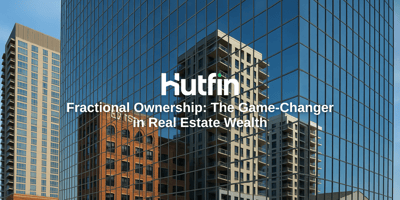Here's what the wealthy have known for centuries that they didn't want you to figure out: you don't...
Tokenization of Commercial Real Estate: Why Hutfin Leads the Way
By Arun Ghosh
Dubai did something interesting a few years ago.
They started tokenizing real estate. Not as an experiment. Not as a pilot program. As a legitimate wealth-building mechanism for their investors. The UAE understood early that fractional ownership of institutional-quality assets creates velocity in capital markets. It creates opportunity. It attracts investors who wouldn't otherwise participate.
Other GCC nations followed. They saw what was working and built on it. They recognized that access matters. That breaking down barriers to commercial real estate ownership accelerates wealth creation across their economies.
Here's what's fascinating: they weren't inventing something new. They were solving a problem that exists everywhere. The problem is simple. Commercial real estate generates wealth. It produces cash flow. It builds equity. It's one of the most reliable assets available. But most people can't access it meaningfully because the entry point is too high.
The question became obvious: why not fix that?

Building the foundation for the next era of real estate investing.
What We're Seeing Emerge
The tokenization movement didn't start in the US. We learned from what was working elsewhere. We studied the models. We understood what created real value versus what was just noise.
The insight is straightforward: fragmenting ownership of quality commercial properties doesn't diminish their value. It distributes it. A five million dollar office building becomes accessible to investors with fifty thousand dollars. A logistics facility with stable tenants becomes an option for someone building their first real estate portfolio.
This isn't complex. A property gets valued professionally. Documentation establishes clear ownership rights. The property converts into digital tokens representing fractional stakes. Investors acquire tokens. Returns flow proportionally from rental income and appreciation.
The mechanism is simple. The impact is significant.
Why The US Approach Matters
American commercial real estate markets operate at scale that few places match. The diversity of assets. The depth of capital. The sophistication of operators. The regulatory clarity that's finally emerging around tokenization. These combine into something powerful.
What Dubai and the UAE proved was that the model works. What the US market provides is the infrastructure to scale it properly.
When you look at the best commercial real estate markets globally, you see certain characteristics. Institutional quality tenants. Professional management. Predictable cash flows. Capital efficiency. These aren't exclusively American, but America has them in abundance across hundreds of markets.
The opportunity is connecting investors with those assets in ways that weren't previously possible.
The Real Advantage
Here's what we have working in our favor: maturity in the market combined with newfound accessibility.
Someone investing through a tokenization platform today has something the early investors in Dubai didn't have. They have proven models. They have regulatory frameworks that have evolved. They have platforms that have refined the process. They have sponsors with demonstrated track records in this specific space.
The learning curve already happened. Now we execute.
A portfolio manager with disciplined capital can access institutional-quality commercial properties across multiple asset classes and geographies. They're not forced into a single massive commitment. They build exposure systematically. They own pieces of office buildings, retail centers, industrial facilities, and mixed-use developments. They receive cash flow distributions. They participate in appreciation.
This expands the universe of what wealth building looks like. You're no longer choosing between rental properties you manage yourself or passive stock market exposure. There's now a third category. Professional-grade assets. Diversified ownership. Passive income potential.
Why Hutfin Represents The Next Step
After seeing how this evolved globally, what becomes obvious is that execution matters enormously.
The difference between a tokenization platform that works and one that doesn't comes down to fundamentals: asset quality, sponsor reliability, structural clarity, and operational excellence.
Hutfin built from the principle that these elements aren't negotiable. They understood that the platform is only as good as what's available on it. That investors are making allocation decisions based on what they see. That sponsor reputation creates the foundation for everything else.
Their approach reflects this. They prioritize sponsor relationships with proven operators. People with track records. People who have successfully developed, managed, and scaled commercial properties. The properties on their platform carry institutional quality. The terms are transparent. The structures are designed so that everyone's incentives align.
More importantly, they made the investor experience intuitive. You understand what you own. You know what returns are reasonable. You can evaluate deals with clarity instead of confusion. That sounds basic, but most platforms fail at exactly this requirement.
The Market Moment
Commercial real estate is repricing right now. Cap rates have expanded. Multiples have compressed. This creates genuine opportunity for investors deploying capital strategically.
Simultaneously, traditional funding sources are becoming selective. Banks are cautious. Institutional capital is more discerning. This creates gaps. Those gaps become opportunities for platforms that can connect quality projects with distributed capital.
An investor with capital can now evaluate multiple institutional-quality properties concurrently. They can build a portfolio that was previously inaccessible at their capital level. They can diversify across asset types, geographies, and sponsor experience in ways that make strategic sense.
This is what tokenization actually enables. This is why what Dubai started, what other GCC nations accelerated, now finds its place in American commercial real estate.
How To Begin
If you're considering fractional commercial real estate ownership, start by understanding what matters most: the quality of assets, the track record of sponsors, the clarity of deal structure, and the reliability of the platform.
Review what's available on Hutfin. Study the properties. Examine the sponsors. Review the documentation carefully. You'll notice the standard is materially higher than what exists on many competing platforms. That's intentional by design.
Then deploy capital systematically. You're building exposure, not making a singular bet. Invest in your first opportunity, understand the mechanics, monitor results, and then scale thoughtfully.
The best investors approach new asset classes with appropriate sizing. They learn the pattern. They expand strategically. Hutfin supports this natural progression.
What This Unlocks

For too long, meaningful commercial real estate wealth creation followed a narrow path. Accumulate capital. Buy property. Manage it. Refinance. Scale. That path works, but it only works for people with substantial starting capital.
Tokenization expands that path. Better projects get funded more efficiently. More people can build wealth through commercial real estate. Capital finds quality assets more easily. Operators access funding without surrendering excessive equity.
This is how mature markets function. Barriers lower. Access expands. Opportunities distribute more broadly. The systems that enable this create value across the entire market.
We're watching what started in Dubai and the UAE mature into something bigger. Something that's now accessible to American investors at scale.
Final Thought
The UAE proved the model works. American markets provide the scale and infrastructure to make it ordinary.
What Hutfin has built is a platform for serious investors ready to participate in this shift. A place where institutional-quality assets meet strategic capital. Where transparency replaces complexity. Where you can own meaningful stakes in commercial real estate built by experienced operators.
The question isn't whether tokenization is legitimate. Market adoption has answered that.
The question is whether you'll actually participate in this opportunity while it's early.



